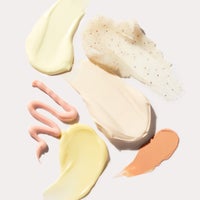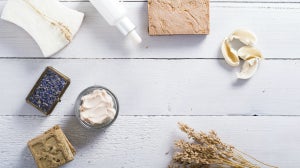
A vitamin-rich ingredient list is as important in your beauty routine as it is in your diet. We've broken down the importance of vitamins, and what they mean for your beauty products.
Vitamin A
Vitamin A may be the closest thing we have to the fountain of youth. Of all the vitamins found in cosmetics, vitamin A is the best supported by evidence. It clears acne and psoriasis, reverses photoageing, enhances skin cell turnover and delivers collagen-boosting, anti-ageing effects to the skin. Vitamin A belongs to a large class of compounds known as retinoids, so choose skincare containing common vitamin A derivatives such as retinol and retinyl palmitate to help minimize fine lines and even skin tone and texture.
Read more about retinol here.
Vitamin B Complex
Vitamin B is a little more complicated. There are eight 'sub' vitamins: B1, B2, B3, B5, B6, B7, B9, B12 which work in tandem but also have their own individual benefits, such as promoting healthy hair, skin and nails. Niacinamide, which is derived from vitamin B3, has antioxidant effects and decreases transepidermal water loss topically, making it a recurring ingredient in the anti-ageing skincare cast.
Pantothenic acid, aka vitamin B5, eases spots and redness; biotin, that's vitamin B7 or sometimes vitamin H, is usually taken to encourage healthy hair and nail growth. Vitamin B deficiencies are linked to hair loss. When ingested, biotin will strengthen hair and nails but it can be hit and miss for the skin, causing breakouts for some but easing skin conditions for others. Topically, the biotin molecule binds to the hair, giving the illusion of thickness. If you struggle with thinning hair, the Grow Gorgeous Hair Density range can help as it's packed with biotin and B vitamins to stimulate the hair for a fuller appearance.
Vitamin C
What's breakfast without a cup of coffee and a glass of OJ? Vitamin C is a powerful vitamin for bolstering the immune system and we've always known it, but it's also championed for its ability to regenerate collagen and clarify the complexion. Vitamin C is coenzyme in the production of collagen and it will effectively brighten the skin and reduce discoloration. It will keep the skin firm and youthful and protect you from UV rays.
There are several different types of vitamin C, such as L-ascorbic acid, ascorbyl palmitate and tetrahexyldecyl ascorbate. L-ascorbic acid is the most potent (and strongly supported by research) but it loses stability when exposed to light. Ascorbyl palmitate and tetrahexyldecyl ascorbate are quite stable, but not as powerful or as effective - these options are better suited to sensitive skin.
Each form of vitamin C has notable antioxidant properties that act as no entry signs for skin problems. This vitamin will also help retexturize the surface of your skin and is a superstar anti-ageing ingredient.
Vitamin D
Vitamin D is essential for inner health and strong bones; topically vitamin D been shown to help treat dry skin conditions such as psoriasis. It's predominantly delivered to the skin via sunshine - great, let's all go to the beach! But whether you live in Hawaii or Alaska, it's not always easy to get the level of vitamin D you need and remember, too much sun exposure accelerates skin ageing.In cosmetics, vitamin D can exert a protective and rejuvenating effect on ageing skin. With the VitaD Fortified Topical Elixir, Skin Authority has become the first to add a whole food source of vitamin D into a topical skin care formula, enhancing daily consumption of vitamin D. The lifestyle brand turned to the research labs of Dole Food Company to supply the only 100% vegan, whole food, plant based source of vitamin D available. The multi-action, lightweight serum provides a topical dose of vitamin D and essential nutrients to nourish the skin for firm, bright luminosity.
Vitamin E
Vitamin E will help 99 beauty problems. It's found naturally found in the skin, but the sun's rays deplete its antioxidant levels. Applying vitamin E topically boosts its availability. The presence of vitamin E is especially important in mature skin. Scientific studies show that vitamin E can protect the skin from environmental pollution. It's also is an A-grade moisturizer, can help heal wounds and repair tissue, and has powerful anti-inflammatory action.
Because it fights off free radicals, vitamin E reduces wrinkles and helps keep skin youthful-looking. Free radicals can impair the healing of scars, by applying vitamin E to the affected area - you might accelerate the healing process.
You'll see vitamin E in so many products, as it conditions dry brittle hair, cuticles and chapped lips alongside skin.
Vitamin K
This one is for you all late-nighters. There is research that supports the claim vitamin K helps reduce the appearance of dark circles under the eyes.
Also, surgeons prescribe vitamin K-rich creams to patients after surgery as it works like an ailment. It encourages blood flow to bruises and allows them to heal. Vitamin K also boosts cell regeneration and conditions the lower layers of the skin. With regular use, vitamin K can also be effective on scars.
Take your vitamins daily in the form of skincare! Receive a FREE Kerstin Florian Correcting Multi Vitamin Day Cream when spending $60 when you enter the code TRYME
| Love Skincare? discover our edit of the b vitamins benefits to add to your collection.. |

Related Articles








